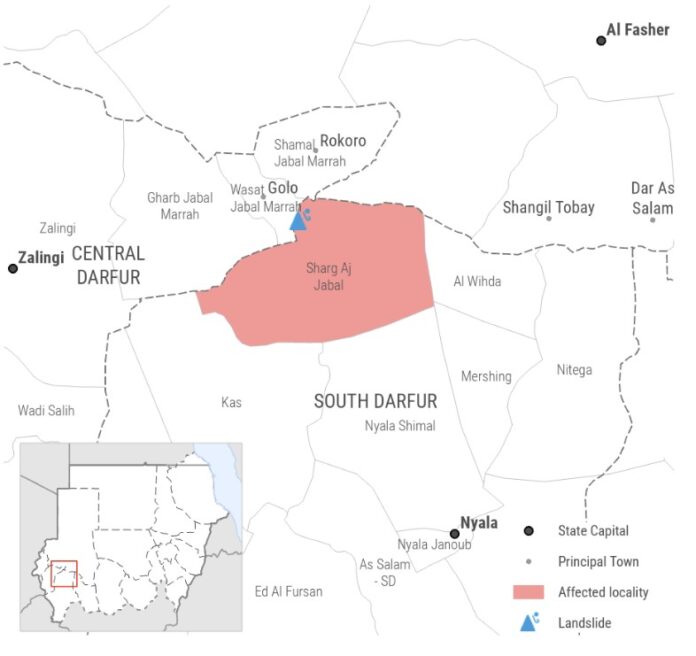OCHA :Landslide in Sharg Aj Jabal, South Darfur State HIGHLIGHTS
Reports indicate that scores of people may have lost their lives after a devastating landslide struck Tarsin village in Sharg Aj Jabal locality, on the border of Central and South Darfur states, at around 1 p.m. on 31 August, following days of heavy rainfall.
Preliminary reports from local sources estimated the death toll at about 1,000, while humanitarian partners have reported significantly lower numbers. An inter-agency assessment will seek to provide verified figures in the coming days.
OCHA is coordinating with humanitarian partners operating in the area to assess needs and mount a response. An Area Inter-Cluster Coordination Group meeting on 2 September discussed the incident and how to support ongoing response efforts.
SITUATION OVERVIEW
Heavy rains triggered a devastating landslide in Tarsin village, located in southwest Suni, Sharg Aj Jabal locality, on 31 August. The area is on the border of Central and South Darfur states.
Initial reports from the Sudan Liberation Movement/Army (SLM/A-AW), which controls the area, indicate catastrophic loss of life, but the death toll remains unclear. According to humanitarian partners, it is difficult to assess the full scale of the incident or confirm the exact death toll, as the affected area is extremely hard to reach. This location experienced a similar landslide during the 2018 rainy season.
In a message of condolence and solidarity, the Acting Humanitarian Coordinator in Sudan, Luca Renda, today said the UN and humanitarian partners are mobilizing to provide support to affected population.
The Government of Sudan and SLM/A-AW have issued statements appealing for urgent humanitarian assistance.
Heavy rains are also affecting the humanitarian response and overall access to the area. According to local sources, the affected area can be accessed from Nyala in South Darfur to Deribat-Soni and to Tarsin using donkeys. Vehicle access may be challenging due to the mountainous terrain, with heavy rain occasionally also affecting internet connectivity.
OCHA is engaging with all relevant actors to ensure access facilitation is granted and no administrative hurdles are imposed, to ensure humanitarian assistance reaches the area.
HUMANITARIAN IMPACT AND NEEDS
According to local sources, the impact of the landslide is severe. The most urgent needs are search and rescue, currently being carried out by local residents, who are the first responders. Shelter and medical assistance are also urgently required.
Humanitarian partners have further expressed concern that the ongoing rainy season could trigger additional natural disasters, such as floods and landslides, compounding the suffering of communities already made highly vulnerable by the ongoing conflict.
HUMANITARIAN RESPONSE
OCHA is coordinating with humanitarian partners who have access to the affected area to assess the situation and respond to the needs of the affected population.
Prior to the disaster, the affected population in Tarsin village typically received assistance from Suni, located 10 kilometres away. Humanitarian partners in Suni include World Vision, which provides ongoing food assistance, cash transfers and protection activities primarily targeting female-headed households.
The World Health Organization also supports a health facility in Suni that provides care to people from Tarsin. These existing programmes and partnerships provide a critical foundation for the emergency response.
COORDINATION
An Area Inter-Cluster Coordination Group (A-ICCG) meeting on 2 September discussed the incident and how to support ongoing response efforts. Participants at the meeting agreed to conduct an inter-agency assessment in the area on 4 September.
As part of an initial response, the team will carry essential medical, reproductive health, food, water, sanitation and hygiene supplies for the affected population.


